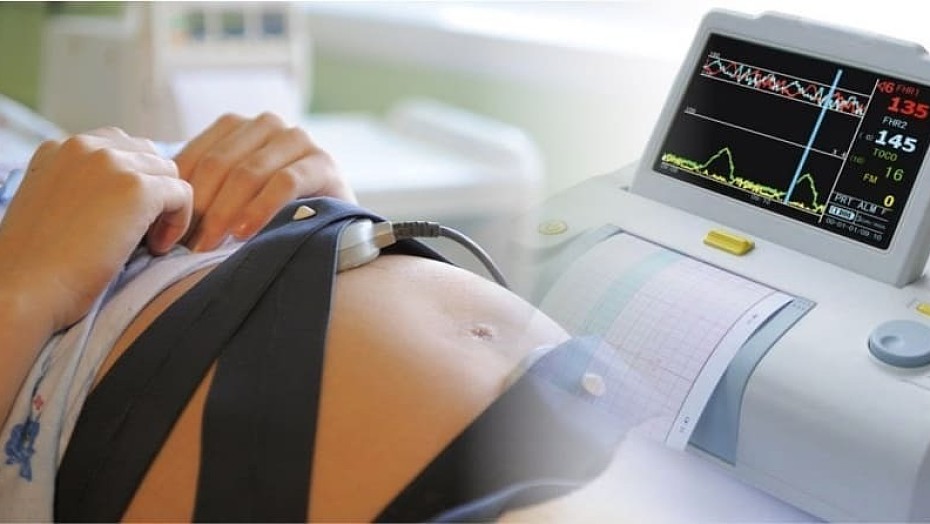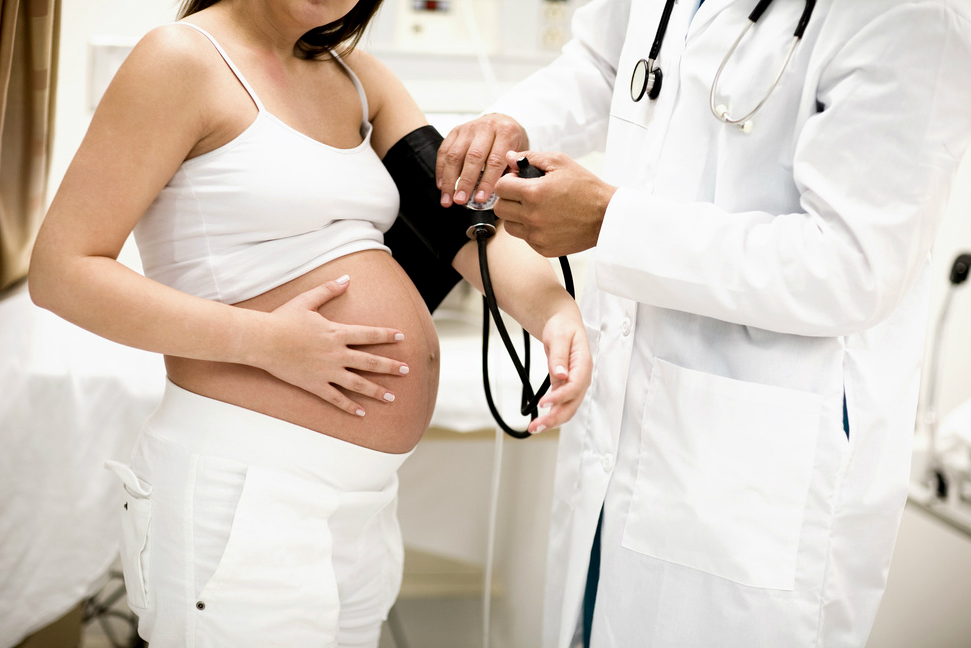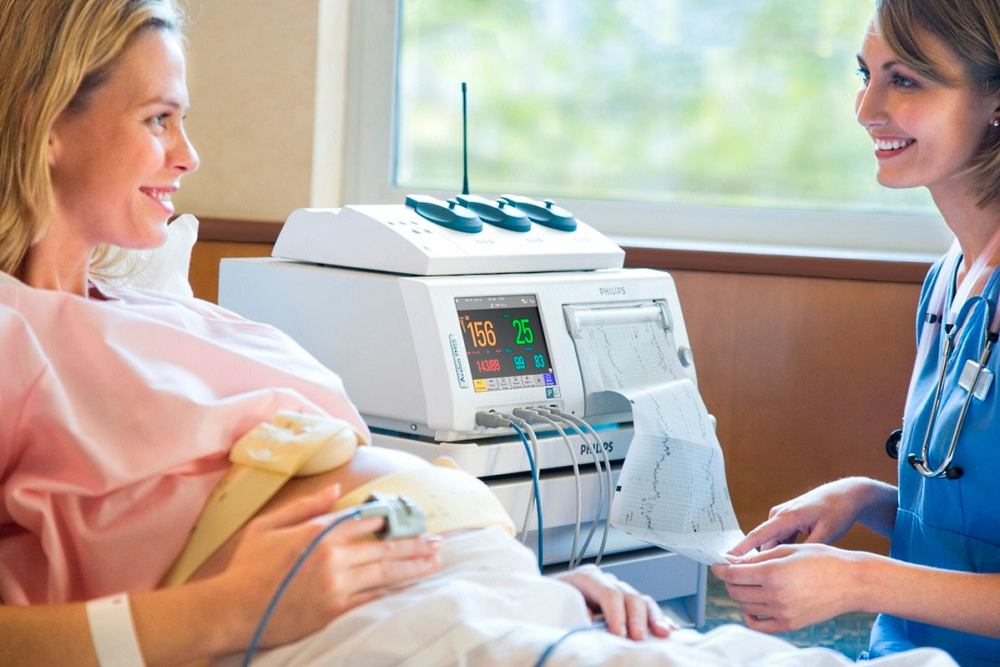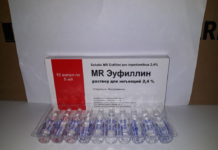Tachycardia during pregnancy can be a physiological phenomenon or a sign of some kind of pathology of the cardiovascular system. You should not immediately panic, if suddenly the doctor found a heartbeat in a future mother. In the early stages, this may simply be a consequence of the increased load on the body.
Material Content:
Causes of tachycardia during pregnancy at different times
The reasons for the development of this condition in the early stages:
- hormonal changes in the body and, as a consequence, increased hormone levels;
- pronounced toxicosis and a violation of the normal water-electrolyte balance;
- stress, nervous breakdowns;
- low pressure;
- increased nervous irritability;
- metabolic disorders, obesity;
- abuse of strong tea or coffee, as well as alcoholic beverages.
 In rare cases, an allergic reaction to certain drugs or vitamin complexes can manifest itself this way. Sinus tachycardia during pregnancy is often a consequence of anemia.
In rare cases, an allergic reaction to certain drugs or vitamin complexes can manifest itself this way. Sinus tachycardia during pregnancy is often a consequence of anemia.
In the later stages, increased heart rate is observed quite often, since there are quite natural physiological reasons for this - the rapid development of the baby, its rapid growth. As a rule, the heart rate increases by one and a half to two dozen units due to increased load. Sometimes a significant increase and elevation of the uterus even leads to a change in the normal anatomical location of the heart, which is accompanied by a frequent heartbeat.
What is the pathology dangerous for the future mother and child
Minor attacks of tachycardia in pregnant women without accompanying symptoms, as a rule, are not dangerous. Many doctors even explain this state of the body by the fact that the fetus requires more nutrients and oxygen. That is why the heart is forced to work more intensively and faster than usual, because it needs to accelerate the movement of blood and activate the flow of oxygen, other substances to a small creature.
 Tachycardia is considered physiological if the pulse does not exceed 90-95 beats per minute.
Tachycardia is considered physiological if the pulse does not exceed 90-95 beats per minute.
The danger is that tachycardia can be a sign of serious heart disease. And in such cases, procrastination can be dangerous for both the mother and her baby. It is impossible not to pay attention to this condition, since it is always accompanied by a number of additional symptoms.
Tachycardia in the fetus is considered very dangerous. Normally, a small person’s heart rate does not exceed 170 beats. If these numbers are greater, constant monitoring is required. The disease in a mild form does not require special treatment. In severe cases, antiarrhythmic drugs are prescribed, although they poorly penetrate the baby due to the placental barrier.
Symptoms and clinical presentation
Symptoms of pathology:
- heart palpitations (over 100 beats per minute in a state of complete rest);
- chest pain;
- sense of anxiety;
- numbness in different parts of the body;
- feeling of lack of fresh air;
- general deterioration in well-being;
- dizziness;
- nausea, sometimes even vomiting;
- heart rhythm malfunctions.
In such cases, you need to urgently contact a cardiologist to prevent possible unpleasant consequences.
 Even if a woman always considered herself healthy, during pregnancy an increased load on all systems and organs can provoke the sudden appearance of various diseases, including heart diseases. Therefore, consulting a competent cardiologist is vital.
Even if a woman always considered herself healthy, during pregnancy an increased load on all systems and organs can provoke the sudden appearance of various diseases, including heart diseases. Therefore, consulting a competent cardiologist is vital.
Late and early treatment
During an attack, a pregnant woman should ensure complete rest, lie down, take the most comfortable pose, close her eyes, try to relax or even fall asleep. The main thing is not to worry and not be nervous, this will only worsen the condition. Attacks, as a rule, do not last long.
The pregnant woman should inform the doctor about her feelings. If necessary, the specialist will send for an additional examination or prescribe special vitamins for the heart. Most often, expectant mothers are prescribed magnesium or potassium, which help regulate heart muscle contractions and normalize the water-salt balance.
 It is strictly contraindicated to prescribe yourself any means or drugs, this can only be done by a doctor and only if there are significant indications. Many medicines are not used during pregnancy, as they can cause irreparable harm to an unborn baby.
It is strictly contraindicated to prescribe yourself any means or drugs, this can only be done by a doctor and only if there are significant indications. Many medicines are not used during pregnancy, as they can cause irreparable harm to an unborn baby.
In case of urgent need and poor health, women can’t do without medication at all. Treatment of tachycardia consists in taking sedative and antiarrhythmic drugs, beta-blockers. A future mother with such a pathology should always be under the supervision of doctors.
Complications and prognosis
The consequences of an undetected and not eliminated pathology can be sad up to a miscarriage in the first trimester and premature birth in the third.
Without adequate treatment, the pregnant woman becomes restless, loses a full sleep, she has an increased level of anxiety, she becomes susceptible to any infections. Tachycardia, which lasts for a long period of time, very often leads to increased pressure, which is dangerous for expectant mothers and can lead to great complications during delivery.
Preventative measures
Prevention is very simple:
- walk more in the fresh air (at least an hour a day);
- regularly ventilate the room;
- take vitamins prescribed by your doctor;
- eat right;
- control the pressure;
- avoid stress;
- rest more, but do not avoid moderate physical exertion;
- use a variety of relaxation techniques.
 It is better to refuse invigorating drinks and give preference to herbal decoctions, water, fruit juices or compotes. It is also necessary to monitor the weight, preventing its excessive increase. Extra pounds always make the heart work more than the norm, and during the bearing of the baby, the load on this organ is significant without it. It is better to eat less, but more often, and only healthy food, excluding fatty dishes, pastries and sweets from the menu.
It is better to refuse invigorating drinks and give preference to herbal decoctions, water, fruit juices or compotes. It is also necessary to monitor the weight, preventing its excessive increase. Extra pounds always make the heart work more than the norm, and during the bearing of the baby, the load on this organ is significant without it. It is better to eat less, but more often, and only healthy food, excluding fatty dishes, pastries and sweets from the menu.
Careful attitude to your health will help prevent unpleasant consequences, safely endure and give birth to a healthy baby.












